Богачи. Фараоны, магнаты, шейхи, олигархи - [184]
Osborn, J., ‘India and the East India Company in the Public Sphere in 18th Century Britain’, in H.V. Bowen, M. Lincoln and N. Rigby (eds), The Worlds of the East India Company (Boydell Press, 2011)
Parks, Tim, Medici Money: Banking, Metaphysics and Arts in Fifteenth Century Florence (Atlas, 2006)
Parthasarathi, Prasannan, Why Europe Grew Rich and Asia Did Not: Global Economic Divergence 1600–1850 ( Cambridge University Press, 2011)
Peston, Robert, Who Runs Britain? How the Super-rich are Changing our Lives (Hodder & Stoughton, 2008)
Pierenkemper, T., ‘Pre-1900 Industrial White Collar Employees at the Krupp Steel Casting Works: A New Occupational Category in Germany’, Business History Review, vol. 58, no. 3 (1984)
Piketty, Thomas, Capital in the 21st Century (Harvard University Press, 2014)
Plutarch, Parallel Lives (Loeb, 1916)
Quinn, James, ‘Dick Fuld of Collapsed Bank Lehman Brothers Says his Mother Loves Him’, Daily Telegraph, 8 September 2009
Rachman, Gideon, Zero-sum World: Politics, Power and Prosperity after the Crash (Atlantic, 2010)
Rajan, Raghuram, Fault Lines: How Hidden Fractures Still Threaten the World Economy (Princeton University Press, 2011)
Redford, D.B., ‘The Beginning of the Heresy’, in Rita E. Freed, Sue H. D’Auria and Yvonne J. Markowitz (eds), Pharaohs of the Sun: Akhenaten, Nefertiti, and Tutankhamen (Museum of Fine Arts, Boston, 1999)
Reeves, Nicholas, Akhenaten: Egypt’s False Prophet (Thames & Hudson, 2005)
Reich, Robert, Supercapitalism: The Battle for Democracy in an Age of Big Business (Icon, 2008)
Reinhart, Carmen M. and Rogoff, Kenneth, This Time is Different: Eight Centuries of Financial Folly (Princeton University Press, 2011)
Riemersma, J.C., ‘Government Influence on Company Organisation in Holland and England 1550–1650’, Journal of Economic History, vol. 10 (1950)
Roberts, Keith, The Origins of Business, Money, and Markets (Columbia University Press, 2011)
Rubinstein, William D., Men of Property: The Very Wealthy in Britain since the Industrial Revolution (The Social Affairs Unit, 2006)
Rubinstein, William D., Who Were the Rich? A Biographical Directory of British Wealth-holders (The Social Affairs Unit, 2009)
Ruggie, John G. (ed.), Embedding Global Markets: An Enduring Challenge (Ashgate, 2008)
Sampson, Anthony, Who Runs This Place? The Anatomy of Britain in the 21st Century (John Murray, 2005)
Sampson, Gareth C., The Defeat of Rome: Crassus, Carrhae, and the Invasion of the East (Pen & Sword, 2008)
Saxena, Anil, East India Company (Anmol, 2007)
Schama, Simon, The Embarrassment of Riches: An Interpretation of Dutch Culture in the Modern Age (Harper Perennial, 2004)
Schatzberg, Michael G., The Dialectics of Oppression in Zaire (Indiana University Press, 1991)
Schatzberg, Michael G., Mobutu or Chaos?(University Press of America, 1991)
Scheidel, Walter and Friesen, Steven J., ‘The Size of the Economy and the Distribution of Income in the Roman Empire’, Journal of Roman Studies, vol. 99 (2009)
Schmitz, David F., The United States and Right Wing Dictatorships 1965– 89 (Cambridge University Press, 2006)
Shevtsova, Lilia, Putin’s Russia (Carnegie Endowment, 2003)
Singleton, Brent D., ‘African Bibliophiles: Books and Libraries in Medieval Timbuktu’, Libraries and Culture, vol. 39, no. 1 (2004)
Skrabec, Quentin R., The Carnegie Boys: The Lieutenants of Andrew Carnegie that Changed America (McFarland, 2012)
Slaughter, Anne-Marie, A New World Order (Princeton University Press, 2004)
Sorkin, Andrew Ross, Too Big to Fail: Inside the Battle to Save Wall Street (Penguin, 2010)
Stearns, Jason, Dancing in the Glory of Monsters: The Collapse of the Congo and the Great War of Africa (Public Affairs, 2012)
Stewart, H. and Goodley, S. ‘Big Bang’s Shockwaves Left us with Today’s Big Bust’, Guardian, 9 October 2011
Strathern, Paul, The Medici: Godfathers of the Renaissance (Jonathan Cape, 2003)
Surk, Barbara, ‘Meet Dubai’s Billionaire Ruler, Sheikh Mohammad bin Rashid al Maktoum’, Huffington Post, 12 April 2009
Swanton, Michael, The Anglo-Saxon Chronicle (Phoenix Press, 2000)
Thomas, Hugh, The Golden Age: The Spanish Empire of Charles V (Penguin, 2011)
Thomas, Hugh, Rivers of Gold: The Rise of the Spanish Empire, from Columbus to Magellan (Random House, 2005)
Thomas, Hugh M., The English and the Normans: Ethnic Hostility, Assimilation, and Identity 1066–1220 (Oxford University Press, 2003)
Thomas, Landon, ‘A $31 Billion Gift between Friends’, New York Times, 27 June 2006
Thomas, Landon, ‘Distinct Culture at Bear Stearns Helps it Surmount a Grim Market’, New York Times, 28 March 2003
Traynor, Ian, ‘Putin Urged to Apply the Pinochet Stick’, Guardian, 31 March 2000
Tweedie, N., ‘Bill Gates Interview: I Have no Use for Money. This is God’s Work’, Daily Telegraph, 18 January 2013
Unoki, Ko, Mergers, Acquisitions, and Global Empires (Routledge, 2013) van Houts, Elisabeth, The Gesta Normannorum Ducum of William of Jumièges, Orderic Vitalis, and Robert of Torigni (Oxford University Press, 1995) van Reybrouck, David, Congo: The Epic History of a People
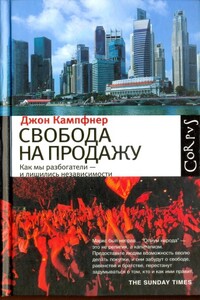
«Демократия перед теми, кто к ней относится серьезно, ставит почти неразрешимые проблемы, а тем, кто ее ненавидит, открывает почти неограниченные возможности», — отмечал Вацлав Гавел. Почему столь многие из нас готовы поступиться «громкими правами» в обмен на процветание и безопасность, часто иллюзорные? И возможен ли свободный рынок без демократии, а демократия — без свободы? Над этими и другими трудными вопросами предлагает задуматься известный английский журналист Джон Кампфнер, изучивший политический опыт Сингапура, Китая, России, Объединенных Арабских Эмиратов, Индии, Италии, Великобритании и США.
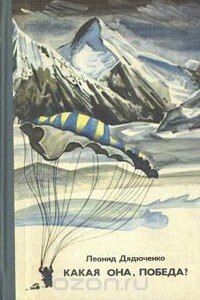
В книге рассказывается история главного героя, который сталкивается с различными проблемами и препятствиями на протяжении всего своего путешествия. По пути он встречает множество второстепенных персонажей, которые играют важные роли в истории. Благодаря опыту главного героя книга исследует такие темы, как любовь, потеря, надежда и стойкость. По мере того, как главный герой преодолевает свои трудности, он усваивает ценные уроки жизни и растет как личность.
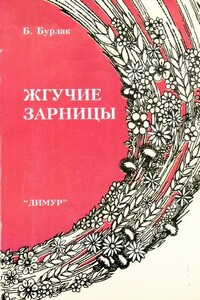
Борис Бурлак — известный уральский писатель (1913—1983), автор романов «Рижский бастион», «Седьмой переход», «Граненое время», «Седая юность», «Левый фланг», «Возраст земли», «Реки не умирают», «Смена караулов». Биографическое повествование «Жгучие зарницы» — последнее его произведение. Оно печаталось лишь журнально.
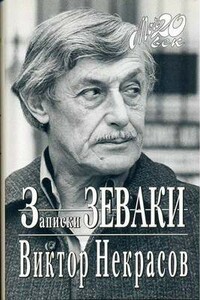
В книге рассказывается история главного героя, который сталкивается с различными проблемами и препятствиями на протяжении всего своего путешествия. По пути он встречает множество второстепенных персонажей, которые играют важные роли в истории. Благодаря опыту главного героя книга исследует такие темы, как любовь, потеря, надежда и стойкость. По мере того, как главный герой преодолевает свои трудности, он усваивает ценные уроки жизни и растет как личность.
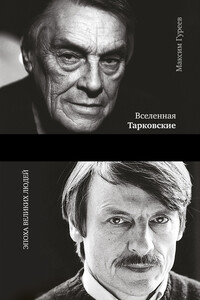
Арсений и Андрей.Отец и сын.Поэт и кинорежиссер.Они знали друг о друге что-то такое, о чем мы можем только догадываться. Конечно, мы будем теряться в догадках, искать параллели и соответствия в том, что было изложено на бумаге и запечатлено на целлулоиде, с тем, как проживаем жизнь мы сами.Предположение исключает уверенность, но рождает движение мысли. И было бы большим заблуждением думать, что это движение хаотично. Конечно, нет, не хаотично!Особенно когда знаешь конечную точку своего маршрута.
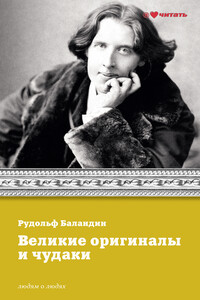
Кто такие чудаки и оригиналы? Странные, самобытные, не похожие на других люди. Говорят, они украшают нашу жизнь, открывают новые горизонты. Как, например, библиотекарь Румянцевского музея Николай Федоров с его принципом «Жить нужно не для себя (эгоизм), не для других (альтруизм), а со всеми и для всех» и несбыточным идеалом воскрешения всех былых поколений… А знаменитый доктор Федор Гааз, лечивший тысячи москвичей бесплатно, делился с ними своими деньгами. Поистине чудны, а не чудны их дела и поступки!В книге главное внимание уделено неординарным личностям, часто нелепым и смешным, но не глупым и не пошлым.

В книге рассказывается история главного героя, который сталкивается с различными проблемами и препятствиями на протяжении всего своего путешествия. По пути он встречает множество второстепенных персонажей, которые играют важные роли в истории. Благодаря опыту главного героя книга исследует такие темы, как любовь, потеря, надежда и стойкость. По мере того, как главный герой преодолевает свои трудности, он усваивает ценные уроки жизни и растет как личность.